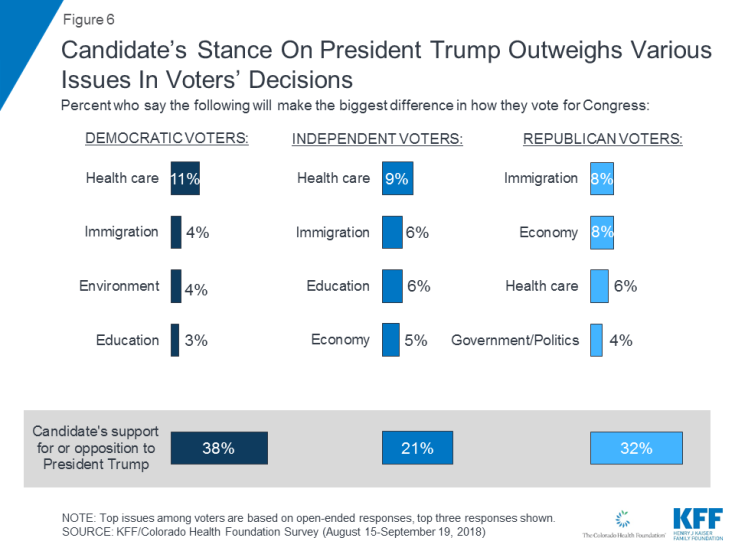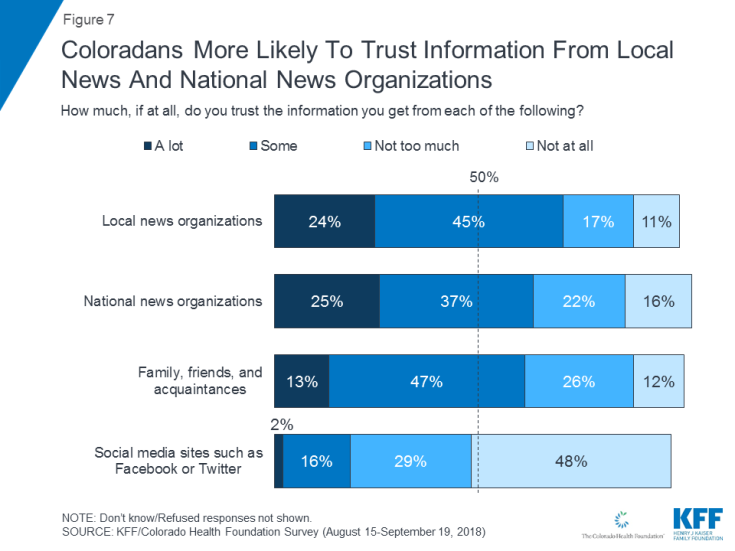Coloradans’ Perspectives on Health, Quality of Life, and Midterm Elections
Section One: 2018 Midterm Elections
Health care is among the top campaign issues for Colorado voters, with one-fifth of voter saying education (21 percent), health care (21 percent), and housing costs (18 percent) are the top issues for the 2018 gubernatorial candidates to talk about. Ranking slightly lower are issues such as the economy and jobs (14 percent), immigration (13 percent), gun policy (11 percent), crime (9 percent), taxes and tax reform (9 percent), and hunger (8 percent).
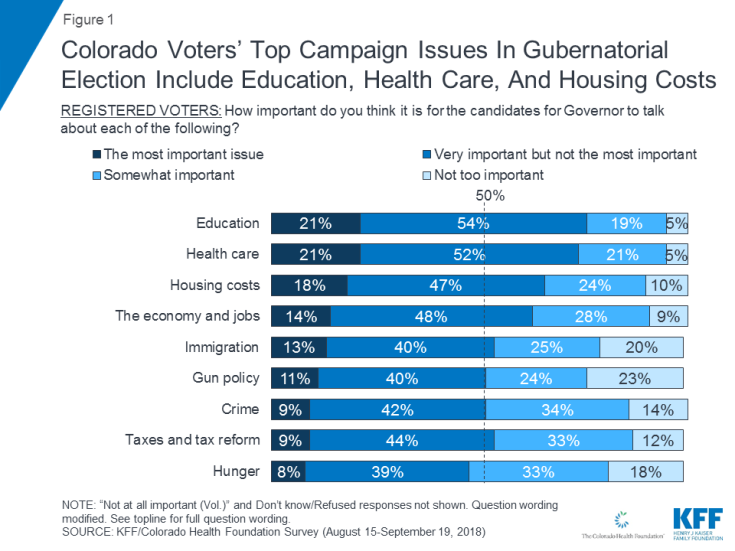
Figure 1: Colorado Voters’ Top Campaign Issues In Gubernatorial Election Include Education, Health Care, And Housing Costs
Similar to the national election landscape, health care is among the top issues Democratic voters in Colorado want to hear the gubernatorial candidates discuss while it ranks lower for Republican voters. One-third of Democratic voters say health care is the most important issue for candidates for Governor to talk about during their campaigns, compared to one in five independents (18 percent) and an even smaller share of Republicans (12 percent). The top issues Republican voters want to hear the gubernatorial candidates talk about are immigration (20 percent) and the economy and jobs (17 percent).
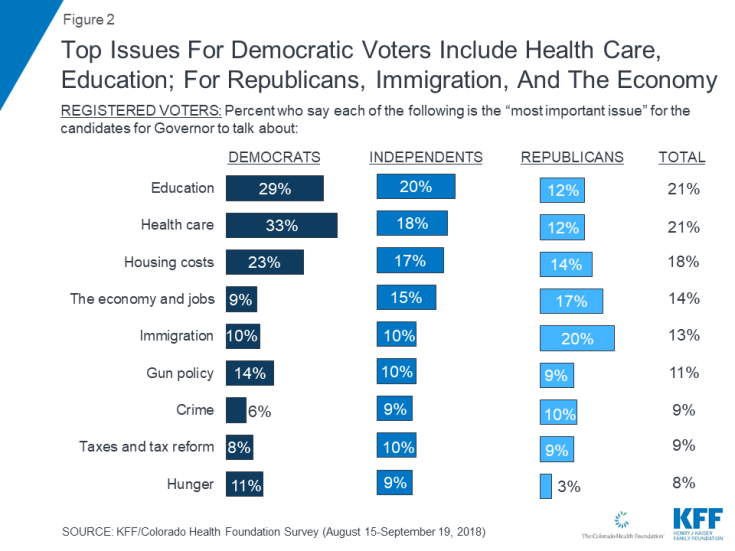
Figure 2: Top Issues For Democratic Voters Include Health Care, Education; For Republicans, Immigration, And The Economy
When voters are asked what explicitly about health care they would like the gubernatorial candidates to discuss, four in ten (41 percent) voters offer health care costs as the most important issue for the candidates to discuss. Health care costs outrank all other health care issues by a margin of at least four to one.
Most voters (59 percent) – including half of Democratic voters (51 percent) and six in ten Republican voters (58 percent) say they are equally as enthusiastic about voting in this gubernatorial election compared to previous ones, while similar shares of Democratic voters (36 percent) and Republican voters (31 percent) say they are “more enthusiastic” about voting this year. Few (about one in ten) voters say they are “less enthusiastic” about voting this year.
While Democrats only have a slight edge when it comes to voter enthusiasm in the gubernatorial election, they have a strong lead in the congressional elections in Colorado. Nearly half of Democratic voters (49 percent) say they are “more enthusiastic” about voting in the Congressional election this year than in previous elections compared to three in ten Republican voters (29 percent) and one-fourth of independent voters (31 percent).

Figure 4: Half Of Democratic Voters Say They Are More Enthusiastic About Voting In This Year’s Congressional Election
President Trump’s Role in the 2018 Midterm Election
Colorado residents, like the country overall, have polarized opinions of the president with six in ten Coloradans (57 percent) disapproving of the job President Trump is doing while four in ten approve (38 percent).
Like most midterm elections, the 2018 election is turning out to be a referendum on President Trump and his agenda. When issues are put up against other voting factors, a larger share of voters say a congressional candidate’s stance on the president will make the biggest difference in how they vote. Three in ten (29 percent) voters say a “candidate’s support for or opposition to President Trump” will make the biggest difference in how they vote for Congress this year, while fewer say “local or state issues” (24 percent), “a candidate’s character and experience” (23 percent), or “specific national issues” (19 percent) will make the biggest difference. Four in ten Democratic voters (38 percent) and nearly one-third of Republican voters (32 percent) say a candidate’s support for or opposition to President Trump will make the biggest difference in their congressional vote choice. Smaller shares – about one five – say either “specific national issues” or “local or state issues” will make the biggest difference. Independent voters are less likely than partisan voters to say “a candidate’s support for or opposition to President Trump” will make the biggest difference (21 percent).
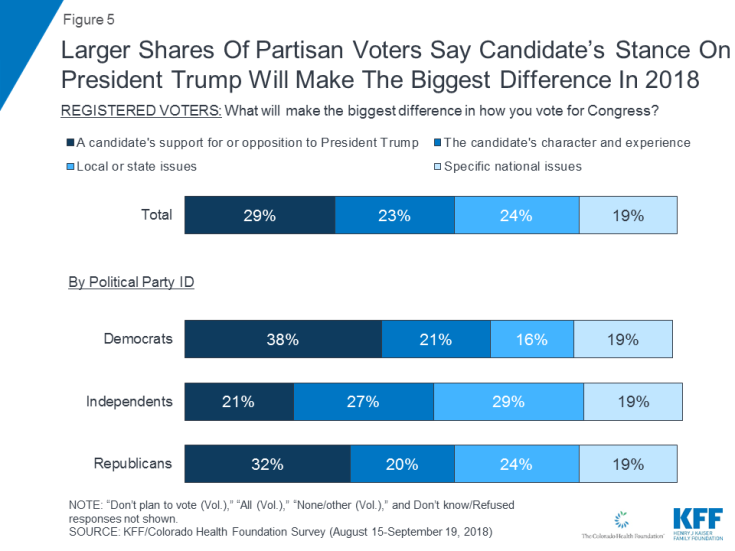
Figure 5: Larger Shares Of Partisan Voters Say Candidate’s Stance On President Trump Will Make The Biggest Difference In 2018
Across all partisans, voters say a candidate’s stance on President Trump will make a bigger difference in how they vote for Congress this year than any specific national, state, or local issue including health care.
Gearing up for the 2018 midterm elections, more than half of Coloradans say they trust the information they get from local news organizations (69 percent), national news organizations (62 percent), or family and friends (60 percent) at least “some” or “a lot.” Fewer Coloradans trust the information they get from social media sites such as Facebook or Twitter (18 percent).


